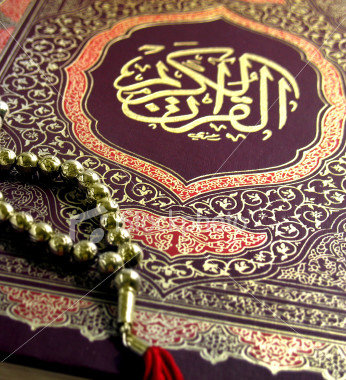Posts Tagged ‘Roza’
- In: Islam | Ramadaan | Ramadan
- 2 Comments
Closed Doors and Opened Eyes: Spirituality for the Non-Fasting

Ramadan is a blessed time of year often characterized by certain specific forms of worship. Fasting, reading Qur’an and performing salah (five times a day prayer) are the main focus of many people’s time and energy during this month. However, for most women a portion of Ramadan – or in some cases the month in its entirety – passes by without being able to engage in these acts, due namely to menstruation or postnatal bleeding. Often this leads us to feeling disconnected from the sacredness and specialness of Ramadan, and feeling deprived of that spiritual rejuvenation and increase in faith many believers experience in these days.
When is Ramadan 2012?
Posted on: July 15, 2012
- In: All | Islam | Ramadaan | Ramadan
- 4 Comments
When is Ramadan 2012?

Ramadan, the greatest religious observance in Islam, is an annual month of fasting. It is the ninth month of the Islamic lunar calendar. Muslims consider this whole month as a blessed month. They fast during the days of this month and make special prayers at night. People also give more charity and do extra righteous deeds. Also, in this Holy Month, The Prophet Muhammad (SallAllaahu ‘Alayhi Wa Sallam) received the first revelation of Al-Qur’an (in one of the last ten odd nights of Ramzan). Ramazan/Ramadhan is the month of celebration as well as the month of discipline and self-control.
What are the dates for Ramadan in 2012?
Answer:
Ramadan is expected to begin on or around July 19, 2012 and will finish on or around August 17, 2012.
Note:
The exact dates of Islamic holidays cannot be determined in advance, due to the nature of the Islamic lunar calendar. Estimates are based on expected visibility of the hilal (waxing crescent moon following a new moon) and may vary according to location.
Following are the description of The Islamic Lunar Calendar and Moon-Sighting at Ramadan (Hilal)
The Islamic Lunar Calendar
Muslims do not traditionally “celebrate” the beginning of a new year, but we do acknowledge the passing of time, and take time to reflect on our own mortality.
Muslims measure the passage of time using the Islamic (Hijrah) calendar. This calendar has twelve lunar months, the beginnings and endings of which are determined by the sighting of the crescent moon. Years are counted since the Hijrah, which is when the Prophet Muhammad migrated from Mecca to Madinah (approximately July 622 A.D.).
The Islamic calendar was first introduced by the close companion of the Prophet, ‘Umar ibn Al-Khattab. During his leadership of the Muslim community, in approximately 638 A.D., he consulted with his advisors in order to come to a decision regarding the various dating systems used at that time. It was agreed that the most appropriate reference point for the Islamic calendar was the Hijrah, since it was an important turning point for the Muslim community. After the emigration to Madinah (formerly known as Yathrib), the Muslims were able to organize and establish the first real Muslim “community,” with social, political, and economic independence. Life in Madinah allowed the Muslim community to mature and strengthen, and the people developed an entire society based on Islamic principles.
The Islamic calendar is the official calendar in many Muslim countries, especially Saudi Arabia. Other Muslim countries use the Gregorian calendar for civil purposes and only turn to the Islamic calendar for religious purposes.
The Islamic year has twelve months that are based on a lunar cycle. Allah says in the Qur’an:
“The number of months in the sight of Allah is twelve (in a year) – so ordained by Him the day He created the heavens and the earth….” (9:36).
“It is He Who made the sun to be a shining glory, and the moon to be a light of beauty, and measured out stages for it, that you might know the number of years and the count of time. Allah did not create this except in truth and righteousness. And He explains His signs in detail, for those who understand” (10:5).
And in his final sermon before his death, the Prophet Muhammad said, among other things, “With Allah the months are twelve; four of them are holy; three of these are successive and one occurs singly between the months of Jumaada and Sha’ban.”
Islamic months begin at sunset of the first day, the day when the lunar crescent is visually sighted. The lunar year is approximately 354 days long, so the months rotate backward through the seasons and are not fixed to the Gregorian calendar. The months of the Islamic year are:
1. Muharram (“Forbidden” – it is one of the four months during which it is forbidden to wage war or fight)
2. Safar (“Empty” or “Yellow”)
3. Rabia Awal (“First spring”)
4. Rabia Thani (“Second spring”)
5. Jumaada Awal (“First freeze”)
6. Jumaada Thani (“Second freeze”)
7. Rajab (“To respect” – this is another holy month when fighting is prohibited)
8. Sha’ban (“To spread and distribute”)
9. Ramadan (“Parched thirst” – this is the month of daytime fasting)
10. Shawwal (“To be light and vigorous”)
11. Dhul-Qi’dah (“The month of rest” – another month when no warfare or fighting is allowed)
12. Dhul-Hijjah (“The month of Hajj” – this is the month of the annual pilgrimage to Mecca, again when no warfare or fighting is allowed)



Note:I’d love to see who visit my website,your views about website. Click here to leave your feedback.

Stay Connected With Free Updates
 |
 |
 |
If you cannot visit this site everyday and would like to receive our articles everyday via email, please click here and enter your email address in the new window.
PLEASE CHK YOUR EMAIL AFTER SUBMITTING EMAIL,YOU MUST CONFIRM SUBSCRIPTION ! |
![]()
10 Points on Excelling Ramadan
Posted on: July 15, 2012
- In: All | Allah الله | Islam | Ramadaan | Ramadan
- 5 Comments
10 Points on Excelling Ramadan

Point One: Have the hunger for Success
- The medicine to help memorize/obtain knowledge is to have the burning desire to learn the subject, including the month of Ramadan:
- If you have the burning desire to succeed in the month of Ramadan, you will succeed it, because you prepare yourself for it.
- So have the heart and desire and don’t ever waste your time. You can also apply this to Ramadan:
- Never give yourself an exit to fail in Ramadan!
- Firstly, people get hopes to do stuff and succeed in Ramadan, then they give themselves an excuse to fail.
Point Two: Set your goals
- Make sure these are high goals
- We have an ultimate goal: To reach janaatal firdous.
- We should compete with each other, because this is something to compete in.
- When you start Ramadan, commit yourself to it, and set your goals to as high as you can.
- So if you want to do a Khatm-al-Qur’an (Read the whole Qur’an), then don’t just set your goal to one, set it to two times, or even three!
- Set a higher goal than you do in other months
- Add more good deeds to your schedule
- At least set it higher than last years
Point Three: Build confidence in Ramadan
- People come to Ramadan with high expectations for themselves, like “Oh, this Ramadan I’ll read 10 times the Quran”, but then other people discourage them.
- They need to build confidence within themselves and know that they can do it!
- No matter how much time you have, sit down and plan out your goals, and plan a strategy on how you’ll achieve these goals, and build confidence within yourself.
Point Four: Do what you love to do in Ramadan
- Some people love to feed the poor, so they cook and feed the poor. Some people like to help, so they help people. Some people like to read the Qur’an, so they read it whenever they get a chance to, etc.
- Do what you really love to do, choose and select, do the good deeds that you love doing, not the ones that you think isn’t really your specialty, or something that you don’t enjoy doing.
- Then gradually, build a habit of doing it as well.
- The Prophet (Sallahu Alayhi Wa Sallaam) commanded us to achieve that which is little yet continuous.
- Some people start Ramadan with doing as many good deeds as they can, and then they burn themselves out, so do little but keep it continuous.
Point Five: Study the successful: learn from the best
- What does this mean
- When we read a story about the successful ones, it boosts our morale and makes us feel like we can relate to it, like when we read a story from the Qur’an, and it makes us feel like we can relate to it.
- So when we learn from the people of the past that were successful, we can see what they did in order to be successful.
- Go and check some biography of some of the scholars and how they spent their times in Ramadan.
- Remember: Keep these stories with you in the month of Ramadan, and every time you feel like you’re getting weaker and weaker, go back to these stories.
Point Six: Be in the company of the successful one
- The previous point was about the people you learn about in stories and books.
- But instead of reading about these successful people, and being like “That was nice, but it was all theoretical”, then why not spend your time WITH the successful ones in your community?
- Who can help you achieve these goals you have, you’ll definitely find at least one or two of these types of people in Ramadan, go look for these people!
- Remember, habits can make you go high in Ramadan or low in Ramadan, they can be very contagious!
- So in order to obtain good habits, associate yourself with them, so be in the company of righteous and good people so you can catch their habits and make them your own.
- If you want to be a high achiever in Ramadan, then you’ll have to be with people who achieve high goals.
- But on the other hand, if you’re with people that have bad habits, then you’ll catch their bad habits.
- The Prophet (Sallahu Alayhi Wa Sallaam) says “The example of the good and bad companion is the example of one that smells perfume vs a blacksmith. With the one that smells like perfume, you’ll smell like perfume like him, but if you’re with the blacksmith, then at the very least you’ll smell really bad.”
- It’s the same thing with people you associate yourself with in Ramadan.
Point Seven: When you work on your goals, go all out and work really hard on them
- When you start your achievements, work hard and go all out on them.
- You won’t try to achieve your goals whenever it’s convenient for you, but rather, whenever you have spare time.
- If you’re serious about achieving these goals, you have to be very serious about them.
- Allah reminded the Prophet (Sallahu Alayhi Wa Sallaam) “When you’re done doing your dawah work outside, put yourself in worship until you get tired.”
- You need to put a priority on these goals that you have.
- The prophet (Sallahu Alayhi Wa Sallaam) reminds us of how to move from one level to the other. He said “There is one night in the month of Ramadan, and whoever achieves it, he has achieved a thousand months”.
- If you want to look for it, then look for it in the last 10 nights. So the sahabah became more focused.
- Then it’s said that it was on an odd night
- The point here is that the prophet keeps reminding the people to be more focused since their momentum is going down.
- So this is what it means to go all out and focus on it since it only comes once a year.
Point Eight: Be prepared and be adaptable
- Be prepared for change!
- Many people, when they come to a program, they start really well but then they start losing momentum later on.
- Expect yourself to change plans in the month of Ramadan
- You need to expect to adapt to the changes in the month of Ramadan. It’s better to do so then to lose hope and give up on your goals and plans.
- Don’t overdo something and don’t have unrealistic goals, but have high goals and be prepared to adapt to these goals
- Do not cancel the good deeds completely that you have started just because you think of the good deeds that you have started was too high to attain.
Point Nine: Remind yourself of the virtue of what you are doing
- Allah says in the Qur’an “Remind and teach the message for that it benefits the believer.”
- You yourself in the month of Ramadan are going to feel tired and exhausted.
- So go to someone and ask for advice and seek help for someone to remind you.
- You yourself remind yourself by sitting a few minutes at night in seclusion and make dhikhr and dua and think about what’s in store for the one who is fasting.
- Every now and then, remind yourself of the virtue of fasting.
- Keep the hadith of fasting in Ramadan handy, and the virtue of the Lailatul Qadr, etc.
- Eventually, go attend a powerful reminder and/or program in the masjid.
Point Ten: Never give up!
- If the shaitaan wants anything from us, he wants us to give up.
- Every time people start making ibadaat, we get weaker, and then we stop doing it because shaytaan keeps whispering into us and saying “Dude, you know you can’t do that right? You’re not the person to achieve this good deed”
- And then you fall into that trap.
- Never GIVE UP!!! Even if you realize that it is the last day of Ramadan and you have missed out on many opportunities to do good still use that moment you have. Even if it is the last hour of RAMADAN! Never give up…
By Sheikh Yasir Birjas (Ramadan Prep Day 4)



Note:I’d love to see who visit my website,your views about website. Click here to leave your feedback.

Stay Connected With Free Updates
 |
 |
 |
If you cannot visit this site everyday and would like to receive our articles everyday via email, please click here and enter your email address in the new window.
PLEASE CHK YOUR EMAIL AFTER SUBMITTING EMAIL,YOU MUST CONFIRM SUBSCRIPTION ! |
![]()
The Nature of Fasting :: E-Book
Posted on: August 26, 2011
- In: All | Allah الله | E-Books | Islam | Ramadaan | Ramadan
- Leave a Comment
The Nature of Fasting
This is a translation one of the smaller publications from the works of Shaykh Al-Islam Taqiuddin Ahmad bin ‘Abdul-Halim Ibn Taymiyyah. It has been published in this form a variety of times with a number of minor additions to the text under the title, “Hagigatus-Siyam,” or, “The Nature of Fasting.” We have revised our version to meet the source section of Majmu’ AI-Fatawa (25:219) from where it appears that the original booklet – with the exception of the questions, of which most appear on earlier pages – has been taken. We have inserted brackets to signify the additions, which earlier publishers probably took from other sections of his writings. We have also added brief references to the text for the Hadiths. I would like to express gratitude to brother Ebrahim Aly Ma’rouf for the original translation of this booklet, and the Darussalam staff for their editing and layout work.
By: Shaykh al-Islam Ibn Taymiyyah
► Download Book..

Check Our Ramadan Resources


Join Us at
Ramadan Kareem || رمَضَان كريم
[post this Article on your facebook wall,and share with friends.click above “Share” button …]

![]() Note:I’d love to see who visit my website,your views about website. Click here to leave your feedback.
Note:I’d love to see who visit my website,your views about website. Click here to leave your feedback.
- In: All | Allah الله | Islam | MC-Islam | Miss-Conception | Ramadaan
- 13 Comments

Misconceptions and Realities about Shabaan
Misconception # 1:
The night of the 15th of Shabaan should be singled out for worship, prayer, etc.
Clarification:
Our best example and role model is the Prophet (Sal Allaahu Alayhi wa Sallam) and he never, ever singled out this night for worship or qiyaam nor did his Sahaba.
Shaykh Ibn Baaz said:”There is no saheeh hadeeth concerning the night of the fifteenth of Shabaan. All the ahaadeeth that have been narrated concerning that are mawdoo (fabricated) and daeef (weak), and have no basis. There is nothing special about this night, and no recitation of Quraan or prayer, whether alone or in congregation, is specified for this night. What some of the scholars have said about it being special is a weak opinion. It is not permissible to single it out for any special actions. This is the correct view.”
(Fataawa Islamiyyah, 4/511)
Misconception # 2:
There are special prayers to be offered on this night.
Clarification:
The truth of the matter is that there are NO special prayers to be offered on this night specifically. And all those ahaadeeth giving you long lists of special formulas that are “supposed to guarantee you Allaahs forgiveness and Jannah” are all fabricated, false and innovations in our Deen. If there were such prayers, the Prophet (Sal Allaahu Alayhi wa Sallam) would have told us about them and we would have had evidence of him and the Sahaba doing it.
Misconception # 3:
Allaah descends to the first heavens on this night to forgive us.
Clarification:
Allaah’s descending to the first heaven does not only happen on the night of the fifteenth of Shabaan. Rather it happens every single night of the year.
The Prophet (Sal Allaahu Alayhi wa Sallam) said: “Every night when it is the last third of the night, our Lord, the Superior, the Blessed, descends to the nearest heaven and says: Is there anyone to invoke Me that I may respond to his invocation? Is there anyone to ask Me so that I may grant him his request? Is there anyone asking My forgiveness so that I may forgive him?. ” (Bukhaari)
Thus, when Abd-Allaah ibn al-Mubaarak was asked about the descent of Allaah on the night of the fifteenth of Shabaan, he said to the one who asked him: “O weak one! The night of the fifteenth?! He descends every night!”�
Misconception # 4:
This is the night when our fate, lifespan, and provisions are decreed.
Clarification:
Some people think that the “blessed night” (laylatim-mubarakah) mentioned in Surah ad-Dukhaan (44): 3, refers to the night of 15th Shabaan, when Allah decrees our lifespan, provisions and fate. In fact, they even pray 6 rakahs, 2 for each of these things. However, all that is fabricated and far, far away from the Sunnah. And, in reality, the “blessed night” mentioned in Surah ad-Dukhaan, actually is referring to Laylatul Qadr that comes in Ramadhaan. (Tafseer Ibn Kathir of Surah al-Qadr)
Misconception # 5:
One should fast on the day of the fifteenth.
Clarification:
Here again, there is no saheeh reports that tell us that the Prophet (Sal Allaahu Alayhi wa Sallam) or his Sahaabah ever picked this day specifically to fast. The Sunnah of the Prophet (Sal Allaahu Alayhi wa Sallam) was to fast most of this month and not just the 15th. However, if the fifteenth of Shabaan coincides with a Monday or Thursday, or with the three white days or if a person is generally fasting, without associating seeking extra rewards to fasting this specific day, then it is allowed. (Sheikh Muhammed Salih Al-Munajjid)
Misconception # 6:
This is the night when the souls of departed ones return to their families.
Clarification:
Here again, some people misunderstand the ayaat in Surah al-Qadr and think that the “sending down of the Ruh” as mentioned in this Surah refers to the souls of dead people returning to see their families, even though it refers to Jibreel (Tafseer Ibn Kathir). And that is why we see women preparing the sweets, the Halwas and other “goodies” for the souls of their loved ones.
Not only is that in itself an erroneous, deviant belief and bidah, but to believe that the souls of the dead can return back to the world and meet/see their relatives is also totally incorrect and false. The teachings of the Quraan and the Sunnah clearly state that the souls of the dead do not return back to the world. Besides, they dont even eat the Halwas. It is actually you who eats it!
Misconception # 7:
Visiting graveyards especially this night is something good.
Clarification:
Although the Prophet (Sal Allaahu Alayhi wa Sallam) encouraged visiting graves, he forbade singling out any day or night for any kinds of good deeds if it is not prescribed in the Shareeah. And he did not specifically visit the graveyard on the night of the 15th of Shabaan. The hadeeth of Aisha that mentions that the Prophet (Sal Allaahu Alayhi wa Sallam) visited the graveyard this night is not authentic and thus does not have any proof for visiting graves specifically on this night of Shabaan.
Misconception # 8:
Even if the ahaadeeth about worship on this night are weak,one can still do it.
Clarification: The correct scholarly view is that weak ahaadeeth should not be followed at all, even if they speak of righteous deeds or of targheeb and tarheeb (promises and warnings). The saheeh reports are sufficient and the Muslim has no need to follow the daeef reports.
Shaykh Ahmad Shaakir said: “There is no difference between rulings or righteous deeds; we do not take any of them from daeef reports, rather no one has the right to use any report as evidence unless it is proven to be soundly narrated from the Messenger of Allaah (Sal Allaahu Alayhi wa Sallam) in a saheeh or hasan hadeeth.”
Misconception # 9:
Look at all those people doing it. How can they all be wrong?
Clarification:
The Muslim is supposed to refer to Allaah and His Messenger (Sal Allaahu Alayhi wa Sallam) Sunnah, if there is any confusion or dispute about matters and NOT what the rest of the world is doing.
“O you who believe! Obey Allaah and obey the Messenger and those of you who are in authority. (And) if you differ in anything amongst yourselves, refer it to Allaah and His Messenger, if you believe in Allaah and in the Last Day. That is better and more suitable for final determination [al-Nisaa 4:59]
Shaykh Ibn Jibreen said: “These reports (about worship and fasting an the 15th of Shabaan) became very well known in some countries which were overwhelmed by ignorance; One should not be deceived by the large numbers of ignorant people who do these things.”
The REAL Sunnah regarding Shabaan:
If you truly and sincerely want to please Allaah and do deeds that will be acceptable to Him, then follow the REAL Sunnah of the Prophet (Sal Allaahu Alayhi wa Sallam). Here is what is proven in the authentic sunnah:
1. Fast most of this month as much as you can.
Aaishah RA said: “I never saw the Messenger of Allaah fasting for an entire month except in Ramadaan, and I never saw him fast more than he did in Shabaan.” (Bukhaari, Muslim).
2. However, if you are weak or do not fast habitually and feel that this nafil fasting may be a hindrance to your obligatory fasting in the month of Ramadhaan, then the person may stop the nafil fasting in the last few days of this month. And for that person, the Prophet (Sal Allaahu Alayhi wa Sallam) said:
“When Shabaan is half over, do not fast.” (saheeh by al-Albaani in Saheeh al-Tirmidhi)
3. If you have fasts left over from last Ramadhaan to make up, then hurry up and do so in this month of Shabaan before the next Ramadhan comes. It is not permissible to delay missed fasts until after the following Ramadhaan, except in cases of necessity (such as a valid excuse that continues between the two Ramadhans).
Aaishah RA said: “It used to be that I had days to make up for Ramadhaan and I would not be able to do so except in Shabaan.” [Bukhari]


 [post this Article on your facebook wall,and share with friends.click above “Share” button …]
[post this Article on your facebook wall,and share with friends.click above “Share” button …]


[where ever you post,please add source link.either in website or even in facebook NOTE…please….spread the link of site..]

![]() Note:I’d love to see who visit my website,your views about website. Click here to leave your feedback.
Note:I’d love to see who visit my website,your views about website. Click here to leave your feedback.















































 Oh Allah,Please Forgive me
Oh Allah,Please Forgive me Ex-Christians-Now Muslim,Alhamdulillah
Ex-Christians-Now Muslim,Alhamdulillah I Love My Prophet Muhammad s.a.w
I Love My Prophet Muhammad s.a.w
















![Fake Grave of Prophet Muhammad [pbuh]](https://islamgreatreligion.files.wordpress.com/2009/07/prophet_muhammad_pbuh_tomb4.jpg)


















Recent Comments